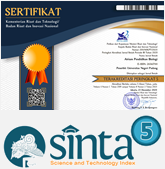DIFFERENCES IN INDEPENDENT LEARNING OF STUDENTS WHO TAKE AND THOSE WHO DO NOT TAKE BIOLOGY TUTORING OUTSIDE SCHOOL
Abstract
Keywords
Full Text:
FullpaperReferences
Abdul Rozak, Irwan Fathurrochman, D. H. R. (2018). Analisis Pelaksanaan Bimbingan Belajar Dalam Mengatasi Kesulitan Belajar peserta didik. OEAI (Journal of Education and Instruction, 1(1).
Abidin, Z. (2006). Layanan Bimbingan Belajar sebagai Upaya Peningkatan Kualitas Proses Belajar Mengajar. Insania: Jurnal Pemikiran Alternatif Kependidikan Layanan, 11(1).
Aini, P. N. (2012). Pengaruh Kemandirian Belajar Dan Lingkungan Belajar peserta didik Terhadap Prestasi Belajar Akuntansi peserta didik Kelas Xi Ips Sma Negeri 1 Sewon Bantul Tahun Ajaran 2010/2011. Jurnal Pendidikan Akuntansi Indonesia, X (1).
Apriyeni, W. (2021). Influence Of Jigsaw Model Which Combined with Paper Operand Idea Technique for Senior High School Student. Jurnal Atrium Pendidikan Biologi Volume 6. Issue 2.
Aslamiyah, T. AL., Punaji Setyosari, H. P. (2019). Blended Learning Dan Kemandirian Belajar Mahapeserta didik Teknologi Pendidikan. Jurnal Kajian Teknologi Pendidikan, 2(2).
Bungsu, T.K., Mulkah Vilardi, Padillah Akbar, M. B. (2018). Pengaruh Kemandirian Belajar Terhadap Hasil Belajar. Journal On Education, 01(02).
Holstein, H. 2006. Murid Belajar Mandiri. Bandung: Remaja Karya.
Jumaisyaroh, T., Napitupulu, E. E. (2014). Peningkatan Kemampuan Berpikir Kritis Matematis dan Kemandirian Belajar peserta didik SMP melalui Pembelajaran Berbasis Masalah. Jurnal Kreano, 5(2).
Ketaren, E. (2021). Implementation of Thinking Aloud Pair Problem Solving Model with Mind Map to Increase Student's Activies and Their Learning Outcoms. Jurnal Atrium Pendidikan Biologi Volume 6. Issue 2.
Lufri dan Ardi. 2017. Metodologi Penelitian. Padang: Universitas Negeri Padang Press.
Ningsih, Y.N., Misdalina, M. (2017). Peningkatan Hasil Belajar dan Kemandirian Belajar Metode Statistika Melalui Pembelajaran Blended Learning.
Praharesti Eriany, Lucia Hernawati, H. G. (2014). Studi Deskriptif Mengenai Faktor-Faktor Yang Bimbingan Belajar Pada peserta didik Smp Di Semarang. Psikodimensia Vol., 13(1).
Pratiwi, I. D., Laksmiwati, H. (2016). Kepercayaan Diri dan Kemandirian Belajar Pada peserta didik SMA Negeri “X”. Jurnal Psikologi Teori &Terapan, 7(1).
Priyatama, A. A. (2013). Competency Profile of The Student of Smk Skill. Jurnal Pendidikan Vokasi, 3(2).
Ramadhan, R. (2018). Perbedaan Tingkat Minat Membaca peserta didik Kelas Viii a Dan Viii D. Jurnal Pendidikan, 5(2).
Rijal, S., Bachtiar, S. (2015). Hubungan antara Sikap, Kemandirian Belajar, dan Gaya Belajar dengan Hasil Belajar Kognitif peserta didik. Jurnal Bioedukatika, 3(2).
Sutisna, R., Hidayat. (2000). Pendidikan budi pekerti. Jakarta Timur: PT. Intimedia Ciptanusantara
Suhendri, H. (2016). Pengaruh Metode Pembelajaran Problem Solving Terhadap Hasil Belajar Matematika. Jurnal Formatif, 3(2).
Sundayana, R., Belajar, K., Masalah, P. (2016). Kaitan antara Gaya Belajar, Kemandirian Belajar, dan Kemampuan Pemecahan Masalah peserta didik SMP dalam Pelajaran Matematika. Jurnal Pendidikan Matematika STKIP Garut, 5(2).
Thahir, A., Hidriyanti, B. (2014). Pengaruh Bimbingan Belajar terhadap Prestasi Belajar peserta didik Pondok Pesantren Madrasah Aliyah Al-Utrujiyyah Kota Karang. Konseli: Jurnal Bimbingan Dan Konseling (E-Journal), 01(2).
DOI: http://dx.doi.org/10.24036/apb.v7i1.11692




